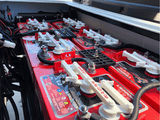Power Outages Could Be Detrimental to Patient Care – They Don't Have to Be
Working in a hospital, things running smoothly is the difference between a tragedy and a miracle. Hard-working doctors, nurses, and staff do everything in their power to perform miracles every day, and they do so tirelessly. Each member of these teams works like a cog in a machine. Their work melds together like a dance; every member of staff contributes irreplaceably to the success of their patient care. So, when technical difficulties arise, it can throw the whole carefully composed machine off. And, in many cases, tragedy can strike right at that moment of vulnerability unless carefully avoided.

Why Power Outages are Detrimental in the Medical Field
Imagine you’re in the middle of administering a dose of medicine to a patient– but the machine administering it glitches as the power suddenly goes out.
Or, for instance, the case of David Taylor, a patient who relies entirely on a ventilator to live. When a power outage struck Texas, his ventilator had to rely on a backup battery to continue functioning. He might have lost his life if he didn’t have a backup battery system ready to go. Thankfully, he received proper medical care from his local doctors and nurses and survived.
Others, however, have not been so fortunate. Three patients died when a power outage hit a hospital in Karnataka, India. Maula Hussain (35), Chettamma (30), and Manoj (18) were each on ventilators at the Vijayanagara Institute of Medical Sciences (VIMS), receiving care when the power went out. A catastrophe that should never happen.
"Preparedness is not simply a hoop to jump through to satisfy the Joint Commission or to keep the Fire Marshall off your back," Dr. Artur Kellermann wrote, who founded the emergency department at Emory University. " It is a fundamental duty to the community, state, and country. Assuming nothing will ever happen or counting on your staff to 'rise to the occasion is not a plan, and it is not preparedness."
Why Being Prepared Backup Batteries and Rechargeable Batteries Will Stop This from Happening
The medical field knows the severity of their jobs– if something goes wrong, lives may be lost. That’s why medical institutions rely on backup solutions in case of power outages and other unforeseen electricity losses. By ensuring your facility has an additional power source, you provide that your patients’ lives are in good hands, no matter what happens.
About Medical Batteries
Medical batteries are typically the same batteries found in backup power systems used in emergencies that power appliances and equipment in homes during a power outage. The length of time a battery-based storage system can provide emergency power to these medical units depends on its overall capacity and the type of medical appliance used.
Hospitals are required by the Joint Commission (a hospital accreditor) to have backup power capabilities for this very reason. In addition, they are required to "load test" those systems a few times each year to ensure they’re working as they should.
Medical Batteries are not designed to provide power for medical systems over an extended length of time. These battery-based storage systems typically use no more than 2 – 10 hours as the situation demands. Replacement batteries are also available, but with the recharging systems in place, they’re scarcely necessary.
Powerstride Has What You Need
Powerstride Battery, a leading retailer in the field, sells medical batteries for all types of medical equipment, including those requiring temporary or emergency power backup from a battery-based storage system.
Permanent and portable X-ray, CT, MRI, oxygen generators, and IV pumps all use batteries for backup or extended use away from AC power supplies.
A POWER OUTAGE WOULD BE DETRIMENTAL— BUT WITH POWERSTRIDE, YOU'RE COVERED
Efficiency, dependability, and security. These are essential considerations when creating a power supply for medical equipment. In addition, to better serve patients, medical devices must be more adaptable, portable, and lightweight. The power solutions that are bringing these technological advancements to life also require less space while providing more energy and longer periods to be operational.
Shopping with Powerstride is as simple as can be– check out some of the brands or medical equipment battery types you’re looking for or click this link to start shopping!
Powerstride provides a wide variety of medical device batteries, such as.
- EKG batteries
- Lithium iron phosphate batteries (li-ion batteries)
- RBC batteries
- Lead acid batteries
- Alkaline batteries
- AGM batteries
- Sealed lead acid batteries
- Battery chargers for all the above, as well as battery packs
Healthcare original equipment manufacturers (OEMs) are required to do the following when creating new, battery-operated medical equipment:
- Experts in the field of medical battery products and rechargeable technology
- engineers with years of experience to contribute to their design team
- Proven techniques for managing projects specific to healthcare and medical products requiring rechargeable batteries
WE ARE HERE TO HELP! If you need help determining which Medical Battery is suitable for you, or have questions about the warranties available, CALL US TOLL FREE at 877-576-9379.
Recent Posts
-
Powerstride’s Proper Battery Care Tip # 1
New batteries should be given a full charge before useThis is a very “common sense” tip! To ge …Apr 12th 2024 -
Aerial Lift Battery Basics
Aerial Lift Battery BasicsOne of the most important tools you have on your job site might be your ae …Feb 27th 2024 -
Golf Cart Battery Basics (UPDATED FOR 2024)
Golf cart batteries are vital to how well a golf cart runs. The batteries can affect speed, accele …Feb 15th 2024



